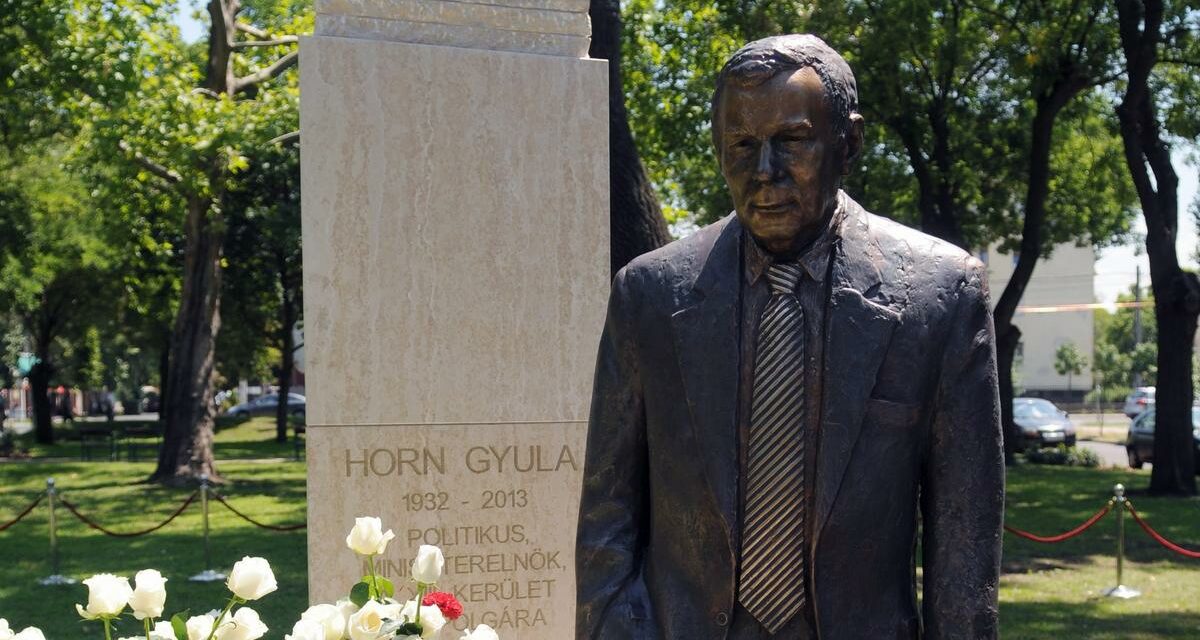All's well that ends well: maybe now it's final that there won't be a Gyula Horn promenade in Budapest.
Although the Capital Assembly passed a resolution on this last June, in fact, a few months before that, the left-left-liberal politicians were proudly standing in front of the name plate.
However, thanks to some clever citizens, economist Zoltán Felföldi and his colleagues, who by initiating the creation of a foundation bearing the name of Gyula Horn forced the MTA's decision on whether such a foundation could be created. The MTA could not have decided otherwise than not, since based on the self-government law, even a non-governmental organization cannot use the name of a person who, in the XX. participated in the foundation, construction or maintenance of autocratic political systems in the 19th century. Mi Hazánk also took an active role in the case, but the fact is that without the mentioned "imaginative" civil foundation initiative, we would not have reached the point where the Government Office of the Capital City of Budapest issued a notice of legality, calling on the capital city to eliminate the illegal situation and change and the name of the promenade in XIII. district.
It is, of course, shocking that the left wing in the capital, namely Ambrus Kiss, continues to claim that Gyula Horn's name sounds excellent to them and that they will not change the name of the promenade, but if they do not do this, then the capital assembly is committing an illegality, and the consequences of that there must be. For example, the dissolution of the general assembly.
However, I don't want to say a few sentences about this myself, but about how the person of Gyula Horn came into question at all in connection with the naming of a public area.
Here we are facing a fundamental problem: how seriously do we take, and how seriously does the left-liberal side in Hungary take, the Hungarian regime change and the Hungarian Basic Law?
Because the first freely elected Parliament already declared that the Hungarian regime change is rooted in the 1956 revolution, its continuation and completion in 1989-1990. As our Basic Law, which was adopted on April 25, 2011 and entered into force on January 1, 2012, states in the preamble of the National Creed: "We agree with the representatives of the first free Parliament, who stated in their first decision that our freedom today comes from our 1956 revolution sprouted.”
Well, the 1956 revolution is the source and moral starting point of our democracy today.
In the suppression of this revolution, Gyula Horn, as a worker's guard at the time, was called "pesties" and took an active part.
From then on, there would be nothing to talk about regarding Horn.
Gyula Horn is not just a XX. dictatorship of the 20th century, so he actively participated in the foundation, construction or – and this is the most important – maintenance of communism, but also in the suppression of the 1956 revolution, which formed the basis of the Hungarian regime change and was also prominently mentioned in our Basic Law. His negative, contemptible activity can therefore also be established in a double sense.
I won't even mention the "little thing" that Gyula Horn was also involved in the III/III law related to secret services - as someone who receives and uses such reports ex officio in the communist system. We know how our Gyula reacted to that: "so what?"
I note Gyula Horn regarding his participation in the political elite of the dictatorship - since he was also foreign minister in the Kádár regime! - was generally characterized by this "so what?" attitude, he never apologized for any part of his participation in the dictatorship. He did not deny his communist past for a single moment.
Of course, this is where the question that many people raise arises: Gyula Horn, apart from his past, was a talented politician, already in the dictatorship, then in the opposition after 1990, and in 1994 he became prime minister. and if we compare it with today's left-wing politicians, we can't help but admit that even today he would stand out among them with his ability, cunning, etc. Moreover, he led his party to victory in 1994.
This may be true, but here comes the moral question: do the unforgivable sins of the past, the active and extremely negative participation in the dictatorship not matter, just because he was otherwise a talented politician?
I declare: János Kádár, indeed, Hitler was also a talented politician. János Kádár came back to Hungary sitting on the tanks of the Soviet army, executed his former comrade, Imré Nagy and his companions, but then, in the sixties and seventies, he undoubtedly endeared himself to the majority of the Hungarian people, made them accept his system founded on violence and blood, and tried to settle international relations well. between, he became the "father of Kádár" of the people.
So: whoever says At, should also say Bt. For those for whom Gyula Horn deserves all respect, please name a street, square, or promenade after the also "very talented" János Kádár in Budapest, or anywhere in the country.
If the criminal past, for which there was never retribution, judgment, prison, etc., does not matter, as in the case of Kádár and Gyula Horn - in the case of the latter, because justice and lustration were missing during the regime change - then what will we become, then what do we even want
Then the regime change was really just a bad joke.
Source: Hungarian Nation
Photo: MTI-Honéczy Barnabás












